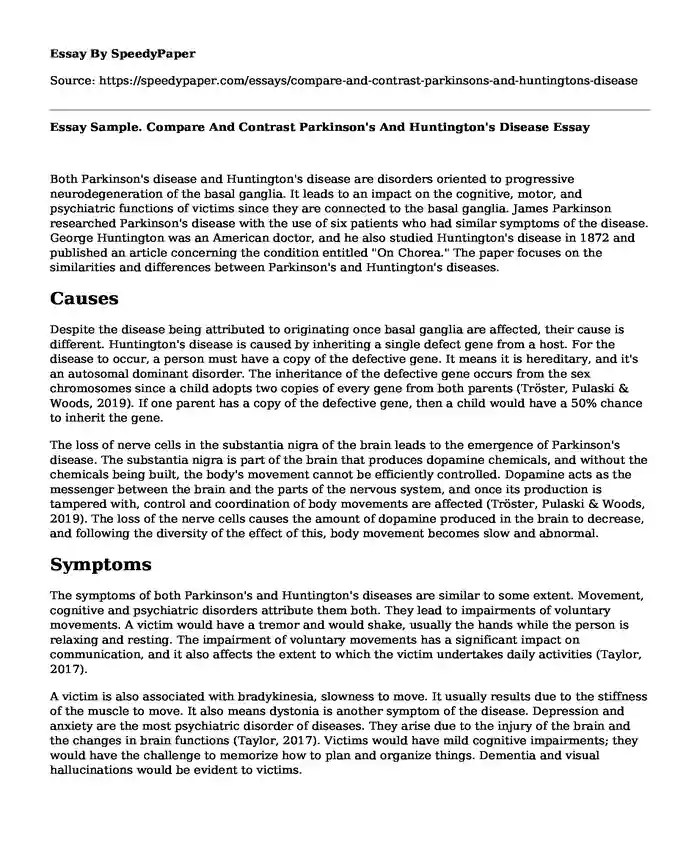
| Essay type: | Compare and contrast |
| Categories: | Knowledge Medicine Disorder |
| Pages: | 3 |
| Wordcount: | 649 words |
Both Parkinson's disease and Huntington's disease are disorders oriented to progressive neurodegeneration of the basal ganglia. It leads to an impact on the cognitive, motor, and psychiatric functions of victims since they are connected to the basal ganglia. James Parkinson researched Parkinson's disease with the use of six patients who had similar symptoms of the disease. George Huntington was an American doctor, and he also studied Huntington's disease in 1872 and published an article concerning the condition entitled "On Chorea." The paper focuses on the similarities and differences between Parkinson's and Huntington's diseases.
Causes
Despite the disease being attributed to originating once basal ganglia are affected, their cause is different. Huntington's disease is caused by inheriting a single defect gene from a host. For the disease to occur, a person must have a copy of the defective gene. It means it is hereditary, and it's an autosomal dominant disorder. The inheritance of the defective gene occurs from the sex chromosomes since a child adopts two copies of every gene from both parents (Tröster, Pulaski & Woods, 2019). If one parent has a copy of the defective gene, then a child would have a 50% chance to inherit the gene.
The loss of nerve cells in the substantia nigra of the brain leads to the emergence of Parkinson's disease. The substantia nigra is part of the brain that produces dopamine chemicals, and without the chemicals being built, the body's movement cannot be efficiently controlled. Dopamine acts as the messenger between the brain and the parts of the nervous system, and once its production is tampered with, control and coordination of body movements are affected (Tröster, Pulaski & Woods, 2019). The loss of the nerve cells causes the amount of dopamine produced in the brain to decrease, and following the diversity of the effect of this, body movement becomes slow and abnormal.
Symptoms
The symptoms of both Parkinson's and Huntington's diseases are similar to some extent. Movement, cognitive and psychiatric disorders attribute them both. They lead to impairments of voluntary movements. A victim would have a tremor and would shake, usually the hands while the person is relaxing and resting. The impairment of voluntary movements has a significant impact on communication, and it also affects the extent to which the victim undertakes daily activities (Taylor, 2017).
A victim is also associated with bradykinesia, slowness to move. It usually results due to the stiffness of the muscle to move. It also means dystonia is another symptom of the disease. Depression and anxiety are the most psychiatric disorder of diseases. They arise due to the injury of the brain and the changes in brain functions (Taylor, 2017). Victims would have mild cognitive impairments; they would have the challenge to memorize how to plan and organize things. Dementia and visual hallucinations would be evident to victims.
Prevention and Treatment
Huntington's disease can be prevented via genetic testing or family planning options. Vitro fertilization and preimplantation genetic diagnosis are among the best ways to prevent Huntington's disease. PD can be restricted via a series of surgeries since there is no known cure for the disease. Deep brain stimulation is the best surgical procedure to prevent the most severe symptoms of Parkinson's disease (Taylor, 2017). There is no known treatment for both conditions, although several medications, changes in lifestyle, and aerobic exercises can help to control the symptoms. Tranquilizers, antidepressants, tetrabenazine, and antipsychotic drugs help to curb HD symptoms. Physical therapy and language pathologists are essential for both Parkinson's and Huntington's patients.
References
Tröster, A. I., Pulaski, S. J., & Woods, S. P. (2019). Neuropsychology of Movement Disorders and Motor Neuron Disease: Parkinson's Disease, Progressive Supranuclear Palsy, Essential Tremor, Huntington's Disease, and Amyotrophic Lateral Sclerosis. In Handbook of Medical Neuropsychology (pp. 415-440). Springer, Cham. https://link.springer.com/chapter/10.1007/978-3-030-14895-9_19
Taylor, B. P. (2017). Comparing Verbal Learning And Memory Profiles In Huntington's Disease And Parkinson's Disease Using The CVLT-II (Doctoral dissertation, San Diego State University). http://search.proquest.com/openview/8fcae61e04bd4b2e71af5c5936ba4a23/1?pq-origsite=gscholar&cbl=18750&diss=y
Cite this page
Essay Sample. Compare And Contrast Parkinson's And Huntington's Disease. (2023, Aug 02). Retrieved from https://speedypaper.com/essays/compare-and-contrast-parkinsons-and-huntingtons-disease
Request Removal
If you are the original author of this essay and no longer wish to have it published on the SpeedyPaper website, please click below to request its removal:
- Paper Sample on College Essays and Their Purpose
- Free Essay: Social Media and Eating Disorders
- Free Essay: Patients with EVD Should Not Receive Cardiopulmonary Resuscitation
- Essay Sample on Socratic Dialogue
- Paper Example: Living and Learning in a Technological World
- Paper on Strategic Dissemination for Diabetes Management: Internal and External Approaches
- Essay Sample on Dorothea Orem - Self Care Theory
Popular categories




